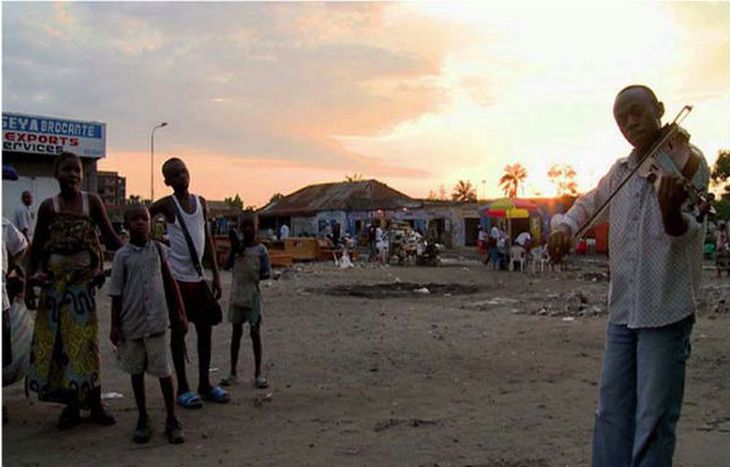
Kinshasa Symphony: why is Mozart in Africa an alien concept?
Published on
Translation by:
Annie RutherfordPeople passionately making music is always good film fodder. This German documentary offers a contrast to the conflicts and states of mind dealt with its 2008 predecessor 'Trip to Asia', which followed the Berlin philharmonic
A vivid market scene in the Congolese capital Kinshasa: hens run through the mud, people sell everything it is possible to sell, the noise from the street is deafening. Around one hundred people sit and stand in the middle of all this and play classical music by Georg Friedrich Handel. Behind them sings a choir - at least until they have to cough because of the dust from the street.
Followed by European music in Africa
The German documentary makers were, as they put it, followed to Africa by European music. At first they had to reproach themselves for asking 'European questions' for their film - why play Beethoven of all music? Isn't it hard to play in these chaotic conditions? How did you learn to play instruments? At some point they just had to accept the fact that this was an African orchestra playing Beethoven. After all, no one would be surprised to hear of a Japanese symphony orchestra. Some of the musicians even find parallels to African rhythms in Beethoven's Ninth Symphony. 'Beethoven played with the passion of the Congo,' is how conductor Armand Diangienda describes the efforts of his unique orchestra.
Some of the musicians even find parallels to African rhythms in Beethoven's Ninth Symphony
Of course the conditions in which the musicians play classical music are difficult. None of them have learnt to play professionally: almost all of the musicians are self-taught and during the day work at their real job as nurses, electricians, mechanics and salesladies for wedding clothes. Diangienda was trained as a pilot. The heat and the damp damage the sensitive instruments; a lack of money means that the instruments are built together accurately by the musicians themselves; power cuts prevent uninterrupted rehearsals in the evenings and families and neighbours do not appreciate their musical efforts. Despite this orchestra members are so enthusiastic about the classical music of Beethoven, Verdi, Handel and Mozart that they stand up to all opposition. 'When I sing, I'm entirely myself, I'm in a different world,' says one choir singer.
Through the documentary, Wischmann and Baer have picked eight musicians from the 185 in the orchestra and follow them almost unobtrusively into crumbling flats, to expensive egg vendors and annoying family members, sometimes somewhat too unobtrusively. They explain that they very consciously decided against an off-screen commentary in order to work against the European attitude which tries to explain everything and comment on everything. The problems and stories should explain themselves. Some directed scenes, separated off from other scenes, develop because of this: individual musicians play their instruments on the street, at the bus station or the boat docks, while noise from the street and the people passing is slowly faded out. What remains are the strained faces and the wonderful music.
Read a review of the film on the official cafebabel babelblog from Berlinhere
Translated from Beethoven zur Berlinale: "Kinshasa Symphony"



